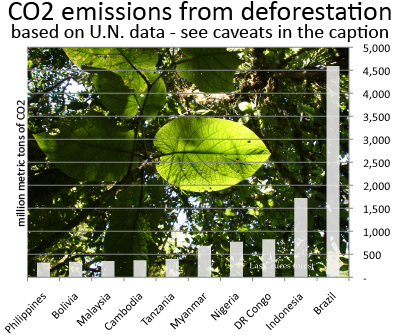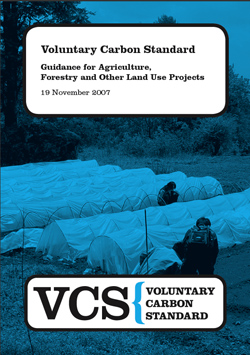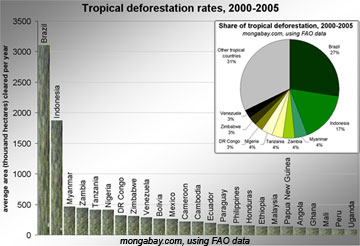New rules establish market for saving rainforests through carbon trading
mongabay.com
November 18, 2008
A new carbon accounting standard will bolster efforts to reduce greenhouse gas emissions resulting from deforestation, thereby creating a financial incentive for saving rainforests, say backers of the initiative, known as the Voluntary Carbon Standard (VCS).
Starting today, land use projects including forestry and agriculture can be validated and verified
against VCS, qualifying them for credits tradable in voluntary carbon markets.
“For the first time ever investors can rely on robust rules for crediting agriculture, agriculture and other land use projects,” said David Antonioli, CEO of the London-based VCS Association, said in a statement. “This is a watershed moment and a shot in the arm for the world’s forests, the world’s climate, and the global carbon market. The new VCS rules will drive much needed investment into protecting the world’s threatened forests as a means to stabilize our global climate.”
The standard may help usher in a new era of “avoided deforestation” projects which capitalize on the carbon sequestration capacity of forests. Deforestation presently accounts for 15-20 percent of anthropogenic greenhouse gas emissions — more than the global transportation sector. Inclusion of agriculture bring the tally from land-use change to roughly one-third of global emissions.
“Now that the leading voluntary carbon standard has incorporated agriculture, agriculture and other land use projects we expect to see the rapid development of a large-scale market for activities that reduce deforestation and degradation,” said Toby Janson-Smith of Conservation International, an NGO that already has several forest carbon projects under development in tropical nations. “Today’s launch of the VCS rules will not only boost market confidence in forest carbon activities but also, for the first time, enable projects that benefit local communities and biodiversity to access significant new global investment.”

Chart based on net deforestation rates from 2000-2005 and average above-ground biomass according to U.N. FAO data. Note that FAO data is controversial and does not account for emissions from drainage and conversion of peatlands or other land-use change, factors that would significantly boost Indonesia’s carbon emissions. It is generally accepted that Indonesia’s emissions from land-use change exceed those of Brazil, which may be over-estimated using raw FAO data. |
Forestry was excluded from the Kyoto Protocol over fears that it would undermine efforts to cut emissions from industrial sources, but support for forest carbon schemes has been growing in recent years led by a coalition of rainforest nations and some environmentalists who see it as a way to make forest conservation pay for itself while funding sustainable development and anti-poverty initiatives. Avoided deforestation is now expected to be a critical component in the next climate agreement, which will be determined a year from now in Copenhagen at the UN Framework Convention on Climate Change.
Until an agreement is reached, forest carbon credits will be limited to the voluntary market where they fetch only a fraction (typically 10-20 percent) of the price seen in compliance markets like the E.U.’s Emissions Trading Scheme (currently trading around $20 per ton of CO2). Still the establishment of criteria under VCS adds credibility to the voluntary market for forest carbon credits, which until now have been priced at a discount even to voluntary market credits. The new VCS rules — which VCS says are “as robust as those of the Kyoto Protocol’s Clean Development Mechanism (CDM)” — will put forest carbon on par with voluntary credits generated by energy and industrial projects.

Voluntary Carbon Standard Guidance for Agriculture, Forestry and Other Land Use Projects |
“One of the key reasons for establishing the VCS was to provide a robust framework within which to innovate with new approaches to offsets without diminishing quality — these new rules for AFOLU projects are a clear example of this innovation in action,” said Mark Kenber, Chairman of the VCSA. “Until now most forestry and land-use projects have been excluded from international carbon markets. They have been left out of the EU Emissions Trading Scheme, made complex in the CDM, and not covered by the Gold Standard because of concerns over the measurability and performance of such projects. Robust new rules introduced under the Voluntary Carbon Standard today change all that and demonstrate that forestry and agriculture projects can be credibly accounted for, which will be very important for future regulatory schemes.”
“Developing forested nations now have a credible standard through which to assess and monetize their forest carbon activities on the international market,” added Pedro Moura Costa, President of EcoSecurities, a carbon-trading firm. “As policymakers around the world work to incorporate reduced emissions from deforestation, degradation and other land-based activities into emerging US and UNFCCC policy frameworks, they should look to the VCS as a model.”
VCS — which is the most widely adopted standard for voluntary offset projects — was developed by The Climate Group, the International Emissions Trading Association (IETA), and the World Business Council for Sustainable Development (WBCSD) as well as a range of business, government and non-government organizations.
The VCS Rulebook:
Voluntary Carbon Standard Guidance for Agriculture, Forestry and Other Land Use Projects
Related articles
Despite financial crunch, donors pledge $100M for rainforest conservation
(10/23/2008) Donors meeting this week in Washington D.C. pledged more than $100 million to the World Bank’s new initiative for conserving tropical forests. In addition to the $100 million in donations, the World Bank announced that more than forty developing countries have asked to join the Forest Carbon Partnership Facility — the Bank’s foray into the emerging market for forest carbon credits. 25 countries have so far been selected to participate in the initiative, which builds capacity for countries to earn compensation through the carbon markets for reducing greenhouse gas emissions by reducing deforestation and forest degradation (REDD). Experts say the mechanism could eventually lead to the transfer of billions of dollars per year to fund conservation and rural development in tropical countries, while at the same time helping fight climate change. Deforestation and land use change presently accounts for around a fifth of anthropogenic emissions.
EU says emissions trading system may fund forest conservation
(10/17/2008) Europe’s carbon trading scheme may be used to generate funds to fight deforestation, reports Reuters. Speaking at a news conference on Friday, EU Environment Commissioner Stavros Dimas said he hoped the EU’s emissions trading scheme could reduce gross tropical deforestation by half by 2020 and eliminate net forest loss by 2030.
Carbon conservation schemes will fail without forest people
(10/16/2008) Mechanisms that use forest conservation to reduce greenhouse gas emissions are doomed to fail unless they are “based on respect for the rights of indigenous peoples and forest communities,” warn environmentalists and indigenous rights groups meeting in Oslo this week. Indigenous groups fear they are being excluded from discussions on Reduced Emissions from Deforestation and Forest Degradation (REDD), a proposed financial mechanism that would compensate tropical countries for reducing emissions caused by deforestation and land use. Such emissions account for a fifth of the global total, or more than the total emissions from transportation. In particular, indigenous groups and forest communities are concerned they will not see benefits from REDD. Worse, some believe the mechanism could trigger a new wave of land grabs and evictions by parties seeking to capitalize on carbon payments. Indigenous groups and forest communities have long struggled against development interests seeking to exploit their traditional lands and resources. But supporters of so-called “avoided deforestation” schemes say that properly-designed policy offers unprecedented opportunities to create sustainable livelihoods for forest people while safeguarding biodiversity and services provided by healthy forest ecosystems.
UK government: rainforests are weapon against global warming
(10/15/2008) Protecting tropical forests will simultaneously reduce carbon emissions, support poverty reduction and help preserve biodiversity and other forest services, says a new report commissioned by the British government. The report — dubbed the "Eliasch Review" after the lead author, Johan Eliasch, a multimillionaire Swede who runs a sports equipment company and owns 162,000 hectares (400,000 acres) of rainforest in the Brazilian Amazon — takes a comprehensive look at the role forests can play in mitigating climate change. It concludes: "Urgent action to tackle the loss of global forests needs to be a central part of any future international deal on climate change"















